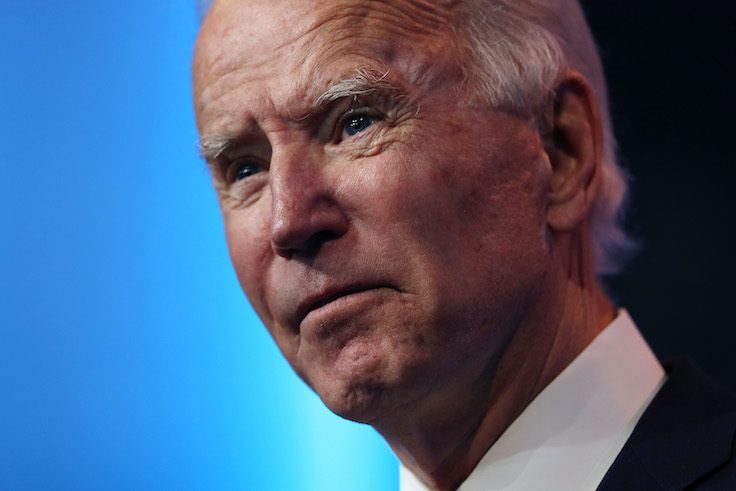The team slated to lead Joe Biden's transition at a top drug agency is devoid of representatives of progressive drug policy organizations, a departure from the president-elect's conciliatory stance on the campaign trail.
A six-man team will steer Biden's takeover of the Office of National Drug Control Policy, which coordinates government anti-narcotic efforts under the aegis of the so-called drug czar. But none in the group come from the array of left-leaning organizations that push for drug decriminalization and legalization, and which have recently exercised influence over more progressive Democrats.
Instead, Biden's ONDCP transition group is heavy on Obama administration veterans, including a former Department of Homeland Security official responsible for narcotics enforcement and a senior ONDCP adviser who has supported decriminalization but drawn a line at the legalization of many drugs.
The absence of progressive drug policy advocates reflects Biden's relative conservatism on drug issues, a stance that puts him increasingly out of step with the organized left. Biden attempted to downplay this difference on the campaign trail, emphasizing his support for decriminalization, particularly to young voters, and selecting arch-reformer Kamala Harris as his running mate. His change of tone has drug-policy progressives worried and ready to push back from day one.
"You have an incoming administration that hasn't been very progressive on marijuana," Maritza Perez, national affairs director of the progressive Drug Policy Alliance, told the Washington Free Beacon. "Joe Biden has proposed rescheduling marijuana, which is insufficient. It doesn't address any of the issues that we've brought up. … So that gives us a lot of cause for concern."
Biden's ONDCP transition team will be led by Rahul Gupta, who served as the public health commissioner of West Virginia, one of the states most ravaged by the drug crisis. In that capacity, he oversaw the state's rollout of medical marijuana but steered away from recommending that users smoke the drug, recommending vaping instead.
This profile—neither an anti-drug hardliner nor a rabid advocate—is characteristic of the other team members. Jacob Rich, a policy analyst with the libertarian-leaning Reason Foundation, highlighted the Urban Institute's Kimberlyn Leary and Georgetown's Regina LaBelle as the other "major players."
Leary and LaBelle "seem like centrists who seek to reduce stigma and prosecution for drug addiction," Rich told the Free Beacon. "LaBelle worked with [Barack] Obama to implement his opioid interventions, so I assume we'll see further reductions in prescribing. I think this will lead to more deaths, but I'm in the minority."
Leary's public profile is largely silent on the issue of drugs, as her expertise is in public health governance more generally. LaBelle, formerly of the Obama ONDCP, has advocated for "prevention and treatment" over "criminalization" of drug use. But she was also, as Rich noted, involved in the Obama administration's push for opioid supply controls. And in a 2018 interview, she said she was "personally … not in favor of legalization of a number of drugs," comparing legal narcotics unfavorably with legal cigarettes and alcohol.
The Biden team also includes Kimberly O'Connor, who served throughout the Obama Department of Homeland Security, at points overseeing the department's counterdrug and counter-narcoterrorism efforts. She also served in the second Bush administration, during which she authored model legislation for state drug courts. Both achievements indicate a profile unfavorable to progressive views on drugs.
Two others round out the team. Mario Moreno served as spokesman for the Obama ONDCP, in which capacity he said that the government supported using both law enforcement and public health approaches to combat drug abuse, and "opposes drug legalization because it runs counter to a public health and safety approach to drug policy." And Dave Noble, currently with the Michigan ACLU, worked for NASA under Obama and is also serving on that transition team.
Perez told the Free Beacon that she was unfamiliar with any of the names on Biden's transition list but said that her organization is pushing for supporters of a "public health" approach to drug policy at agencies like ONDCP and the DEA. Biden has "a lot to prove," Perez said, noting his historical opposition to marijuana legalization and support for "tough on crime" policies.
That attitude carried forward to the 2020 Democratic primary, where Biden was one of only two major candidates to oppose marijuana legalization (the other was Michael Bloomberg).
While refusing to compromise on legalization, Biden made every gesture during the campaign of being sympathetic to drug reformers' agenda, advocating for decriminalizing the drug at the federal level and calling for its use to be prosecuted as a misdemeanor rather than a felony. His choice of Harris, who publicly bragged about using pot, may also have been a conciliatory gesture.
But his views put Biden to the right of most Democrats and have attracted criticism from groups like the Drug Policy Alliance and the National Organization for the Reform of Marijuana Laws, which slammed him in the primary.
That oppositional stance is unlikely to abate as Biden moves from campaigning to governing. Last week, NORML released a letter congratulating him on his election but demanding he appoint an attorney general who will refuse to enforce federal marijuana laws. That was the stance taken by Obama attorney general Eric Holder but dropped under the Trump administration. But a Biden attorney general might face a tough confirmation battle if he or she promises to reinstate the Obama-era policy.
Perez, for her part, is more bullish about Harris, who is the primary sponsor of the Drug Policy Alliance's proposal to legalize marijuana federally, and who Perez believes will shape the more recalcitrant Biden.
Harris's past support "does give me and other advocates some hope that she will be able to nudge him a bit on these issues," Perez said. "She has expressed that she has no reservations explaining her policy positions to president-elect Biden."
